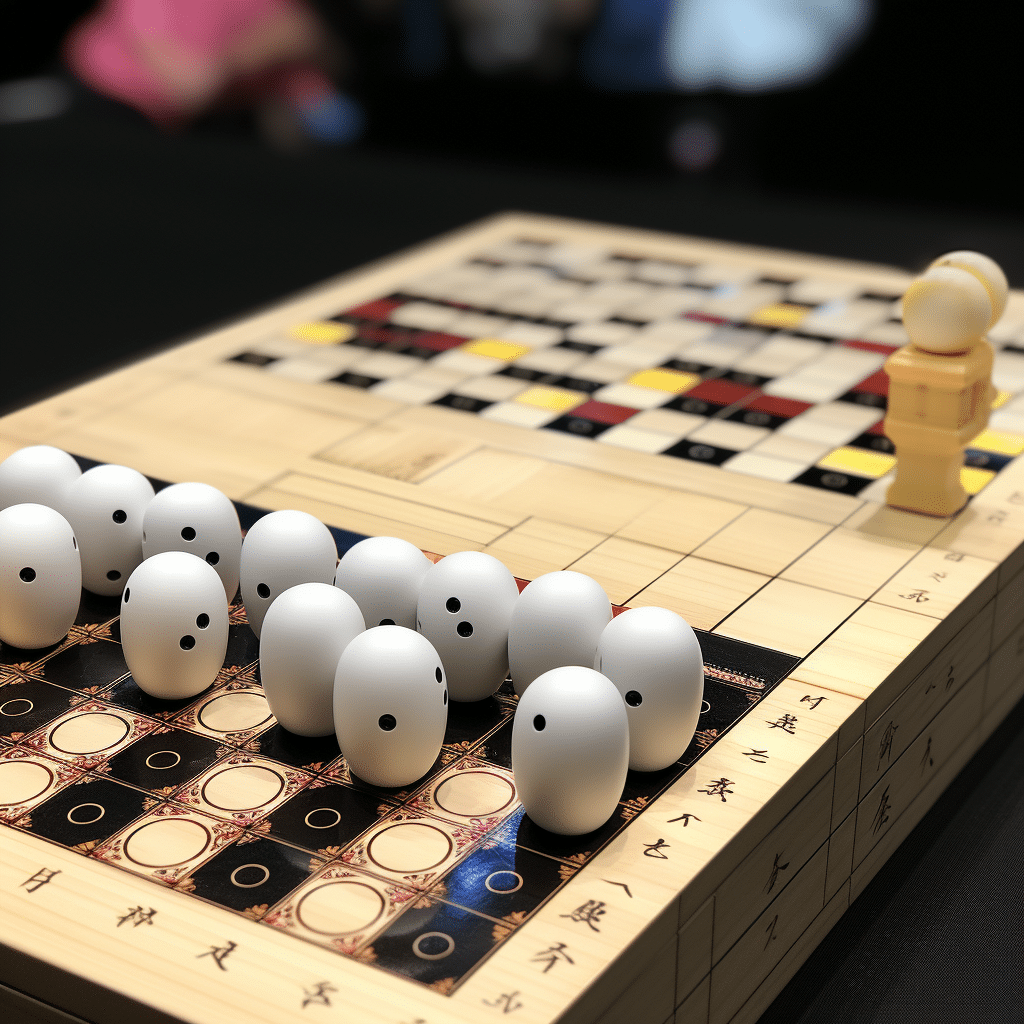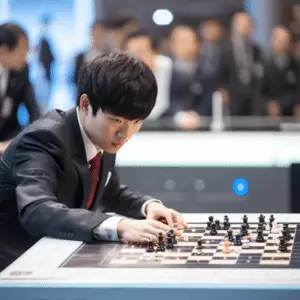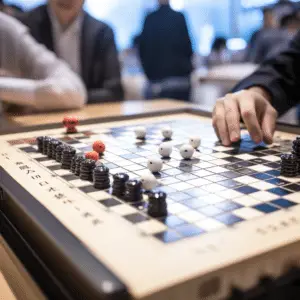
From AlphaGo to MuZero: AI Gaming Evolution, Artificial Intelligence (AI) has made remarkable advancements
in the field of gaming, revolutionizing the way machines play complex games against human opponents. Two prime examples of such breakthroughs are AlphaGo and MuZero.
AlphaGo: The Game-Changer

AlphaGo, developed by DeepMind Technologies, paved the way for AI by defeating world champion Go player, Lee Sedol, in March 2016. The mastery of Go, a game with an astonishingly large number of possible moves, had long been considered a grand challenge for AI. AlphaGo combined deep learning techniques with Monte Carlo Tree
Search algorithms to become an extraordinary and unbeatable Go player. It inspired researchers to further explore AI’s potential in developing powerful game-playing agents.
MuZero: The Next Frontier
Building upon the success of AlphaGo, DeepMind introduced MuZero in 2019. Unlike its predecessor, MuZero doesn’t rely on human expertise or predefined rules for training. Instead, it learns entirely through self-play. The algorithm is capable of mastering multiple games, including chess, shogi, and Go, achieving superhuman performance without any prior knowledge of the game’s rules or strategies. MuZero utilizes a combination
of deep neural networks, simulation-based search, and reinforcement learning to adapt and improve its decision-making abilities over time.
The Impact and Future
The rapid advancement of AI in games extends beyond the entertainment industry. It serves as a testing ground to develop sophisticated AI algorithms capable of handling complex real-world problems. The deep neural networks employed by AlphaGo and MuZero have paved the way for further research and applications in diverse fields such as
medicine, finance, and self-driving vehicles.
The future holds exciting potential as AI continues to evolve. Researchers are now focused on real-time strategy games, creating AI agents capable of collaborating with human players instead of just competing against them. These developments will aid in addressing real-world challenges that require both human and AI intelligence
working together, taking us one step closer to a symbiotic relationship between humans and machines.
Conclusion
The evolution of AI in gaming, from AlphaGo’s groundbreaking victory to the remarkable abilities of MuZero, showcases the progress being made in the field of artificial intelligence. As AI algorithms continue to evolve, we can anticipate countless new applications in various industries. While the future is uncertain, it is clear that the fusion of human ingenuity and AI capabilities holds immense potential to transform our world.
How will AI games from AlphaGo to MuZero affect decision-making, problem-solving, and strategy?

The advancements in AI gaming, particularly from AlphaGo to MuZero, have significant future implications in various fields such as decision-making, problem-solving, and strategy development.
1. Decision-making:
AI systems like MuZero have demonstrated remarkable decision-making capabilities by learning and improving through self-play. This technology can be applied to complex decision-making scenarios in various industries, including finance, healthcare, logistics, and autonomous systems. AI-powered decision-making algorithms can analyze vast amounts of data, consider multiple factors, and make optimized choices faster than humans. This can lead to more efficient and accurate decision-making processes.
2. Problem-solving:
AI gaming systems rely on advanced algorithms to solve complex problems. As these algorithms become more sophisticated, they can be applied beyond gaming to real-world problem-solving scenarios. For example, AI-powered robots could use similar techniques to navigate and solve intricate problems in dynamic environments like disaster response, space exploration, or industrial automation. The ability to improve problem-solving skills through self-play and reinforcement learning can have far-reaching implications in advancing AI’s problem-solving capabilities.
3. Strategy development:
The AI advancements in gaming have showcased the ability to develop optimal strategies by evaluating different possibilities and predicting future outcomes. These strategies can be translated into various domains, such as business strategy, military planning, or sports coaching. AI systems can analyze vast amounts of data, identify patterns and trends, and provide insights for devising winning strategies. This can empower decision-makers to have a more comprehensive understanding of the potential outcomes and make more informed strategic choices.
Overall, the advancements seen in AI gaming have the potential to revolutionize decision-making, problem-solving, and strategy development in numerous fields. By leveraging the capabilities of AI systems like MuZero, industries can benefit from more efficient and accurate decision-making processes, enhanced problem-solving capabilities, and optimized strategies. As AI technologies continue to evolve, their impact on these fields is likely to grow, opening up new opportunities and challenges for businesses, organizations, and society as a whole.
How has AI’s advancement from AlphaGo to MuZero affected intelligent gaming systems and their potential uses beyond games?
The evolution of AI from AlphaGo to MuZero has had a significant impact on the development of intelligent gaming systems and their potential applications beyond games.
AlphaGo, developed by DeepMind, was a breakthrough AI system that mastered the game of Go, one of the most complex board games. It used deep reinforcement learning techniques and defeated the world champion, demonstrating the potential of AI in challenging, strategic games.
However, AlphaGo had limitations as it was designed for a specific game and required extensive human knowledge for training. This led to the development of MuZero, another AI system by DeepMind.
MuZero is a more advanced model that doesn’t require prior knowledge of the game rules or gameplay. It learns by playing against itself, simulating the game environment, and optimizing its strategies through a combination of reinforcement learning, Monte Carlo tree search, and neural networks. MuZero has achieved state-of-the-art results in several domains, including chess, shogi, and video games.
The impact of this evolution can be seen in various aspects:
1. Enhanced Gaming Experience:
Intelligent gaming systems like MuZero can provide more challenging and adaptive gameplay experiences. It can dynamically adjust difficulty levels based on the player’s skills, offering a personalized experience and keeping players engaged.
2. Game Design:
The development of intelligent gaming systems has influenced game design, as designers can now integrate AI opponents or assistants that provide a more realistic and immersive experience. These systems can adapt and learn from user behavior, enhancing the overall game design and making it more interactive.
3. AI Tools for Developers:
The advancements in AI, particularly in reinforcement learning, have provided developers with powerful tools and algorithms. They can leverage these techniques to create intelligent NPCs (non-player characters) or game engines that behave intelligently and realistically, enriching the overall gameplay experience in various genres of games.
4. Transfer Learning:
The techniques used in intelligent gaming systems like MuZero have the potential to be applied in other domains beyond games. The ability to learn from scratch and generalize knowledge can be beneficial in areas such as robotics, autonomous vehicles, and simulations, where adaptation and decision-making are crucial.
5. AI Research and Innovation:
Intelligent gaming systems have boosted AI research. Researchers are developing new algorithms, models, and methods to improve AI’s performance in games and apply the information to real-world situations. Gaming AI has spurred AI breakthroughs.
From AlphaGo to MuZero, AI has tremendously influenced intelligent game system development. It has improved gameplay, game design, developer AI tools, transfer learning to other domains, and AI research and innovation. These developments could help construct intelligent systems outside of gaming.
How does AlphaGo’s success in playing the game of Go compare to the advancements made by MuZero in AI gaming?
AlphaGo’s ability to play the game of Go well was a big step forward in AI gaming. Lee Sedol was the best Go player in the world in 2016. In 2016, AlphaGo beat him in a five-game match. This showed that AI is smarter than humans and can beat them at complicated, strategy games.
On the other hand, MuZero made more progress in AI games by taking a more general approach. MuZero doesn’t know anything about the game it plays before it starts. This is different from AlphaGo, which used a lot of training data and expert knowledge of the game rules. It only learns the rules of the game and how to play by playing by itself and getting feedback.
MuZero can play multiple games without human assistance or game-specific training data. It beats people at chess, shogi, and Go without knowing the rules or plans.
MuZero’s advances provide a more broad and adaptable technique to learn multiple games, building on AlphaGo’s success. MuZero’s success allows AI systems to learn and perform effectively in many tough games.









Thank you for your sharing. I am worried that I lack creative ideas. It is your article that makes me full of hope. Thank you. But, I have a question, can you help me?
Thank you for your sharing. I am worried that I lack creative ideas. It is your article that makes me full of hope. Thank you. But, I have a question, can you help me?
Your point of view caught my eye and was very interesting. Thanks. I have a question for you.